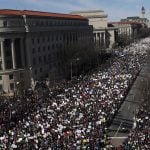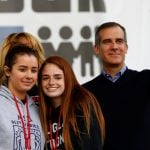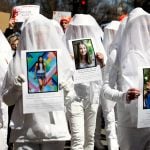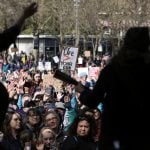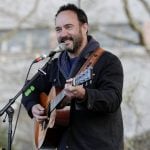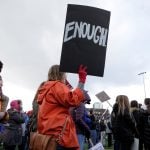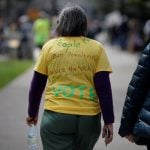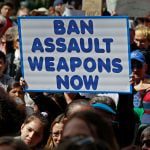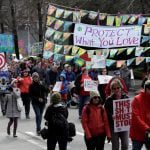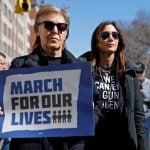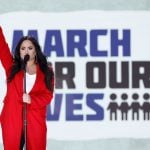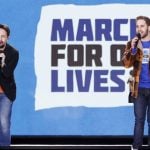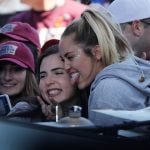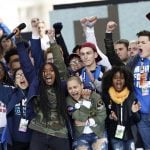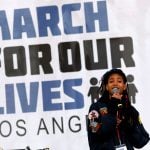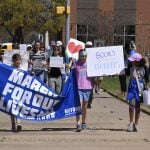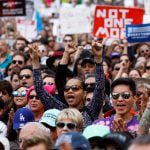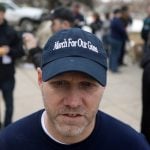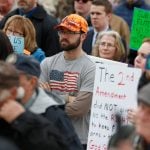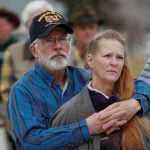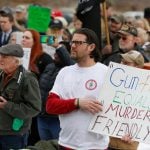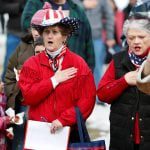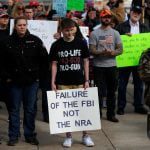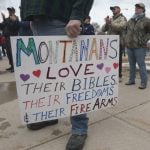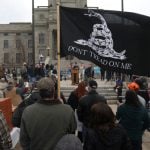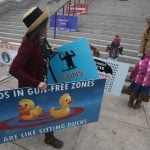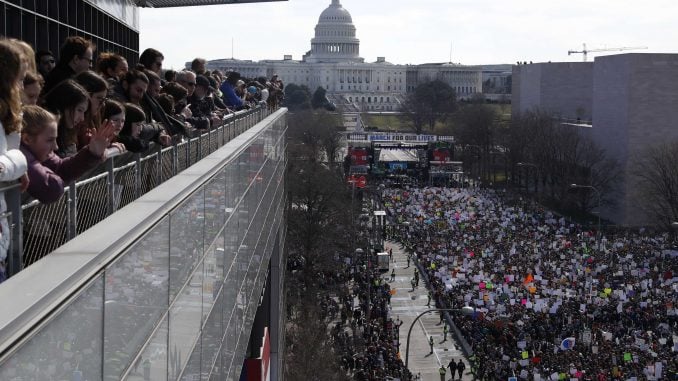
WASHINGTON, D.C. – Chanting “never again,” hundreds of thousands of young Americans and their supporters rallied across the United States, including Raleigh, Greenville and Asheville, on Saturday to demand more government restrictions on firearms access. The marches follow an effort by students of Parkland High School in Florida, the site of last month’s Florida shooting that claimed 17 lives. Supporters of gun rights also held a March for our Guns protest in numerous cities, citing the constitutionally-protected right to bear arms.
The demonstrations came the day after President Trump signed a $1.3 trillion spending bill that included the bipartisan Fix NICS (National Instant Criminal Background System) Act, providing financial incentives for state reporting to the current criminal database. The funding measure also includes the Stop School Violence Act 2018 a measure passed by the House that provides grants for security training, metal detectors, stronger locks, emergency notifications, and other plans to improve school safety.
Gun control lobbying group Everytown for Gun Safety helped plan and coordinate the events and at the rallies, along with organizers who also coordinated The Women’s March after Donald Trump was sworn in as President of the United States. While protesters called for more gun control, voter registration activists fanned out in the crowds, signing up thousands of the nation’s newest voters.
At the largest March For Our Lives protest, demonstrators jammed Washington’s Pennsylvania Avenue where they listened to speeches from survivors of the Feb. 14 mass shooting at Marjory Stoneman Douglas High School in Parkland, Florida.
One of the most emotional presentations came from Parkland teen, Emma Gonzalez, read the names of the 17 victims and then stood in silence. Tears ran down her cheeks as she stared out over the crowd for the rest of a speech that lasted six minutes and 20 seconds, the time it took for the gunman to slaughter them.
“Politicians: either represent the people or get out. Stand with us or beware, the voters are coming,” Cameron Kasky, a 17-year-old junior at Marjory Stoneman Douglas, told the crowd.
Another survivor, David Hogg, said it was a new day.
“We’re going to make sure the best people get in our elections to run not as politicians, but as Americans. Because this – this – is not cutting it,” he said, pointing at the white-domed Capitol behind the stage.
Youthful marchers filled streets in cities including Atlanta, Baltimore, Boston, Chicago, Los Angeles, Miami, Minneapolis, New York, San Diego and St. Louis.
‘TAKE THEIR LIBERTY AWAY’
Underlining sharp differences among the American public over the issue, organizers of the anti-gun rallies want Congress, many of whose members are up for re-election in November, to ban the sale of assault weapons like the one used in the Florida rampage and to tighten background checks for gun buyers while, on the other side of the debate, gun rights advocates pointed to constitutional guarantees of the right to bear arms.
“All they’re doing is asking the government to take their liberty away from them without due process,” Brandon Howard, a 42-year-old Trump supporter, said of the protesters in the capital. He had a sign saying: “Keep your hands off my guns.”
Demonstrations in support of the Second Amendment popped up in cities across the country including Boston, Helena, Reno, Phoenix, and Salt Lake City, and Albuquerque.
“The problem that I have with March for Our Lives is they didn’t invite us,” Shawn Haufe, a combat veteran with Gun Owners of New Mexico told local Albuquerque television station KOB-TV. “All they’re doing is an echo chamber that they want everybody to hear them but won’t give anyone else an opinion.”
“You can’t regulate evil. You can’t stop evil,” Haufe added. “The problem is if you eliminate one tool they’re going to find another tool and use it.”
Wearing a red “Make America Great Again” sweatshirt, 16-year-old Connor Humphrey of San Luis Obispo, California, said: “Guns don’t kill people. People kill people.” Humphrey, who was visiting Washington with his family for spring break, said he owns guns for target shooting and hunting and uses them responsibly. His school had a lockdown exercise last week.
“I think teachers should have guns,” he said, echoing a proposal made by Trump to allow more school resource officers and other trained staff to be armed on campus.
CELEBRITIES BACK STUDENTS
The high-profile cast of the rallies in Washington, D.C. in New York drew crowds and world attention as they featured musicians and actors from Hollywood performing for the crowd and giving kudos and cash to the march organizers. Singers Demi Lovato and Ariana Grande, as well as “Hamilton” creator Lin-Manuel Miranda, among those performing in Washington. Actor George Clooney and his human rights attorney wife, Amal, donated $500,000 and said they would be at the Washington rally.
Among those marching next to New York’s Central Park to call for tighter gun controls was pop star Paul McCartney, who said he had a personal stake in the debate.
“One of my best friends was shot not far from here,” he told CNN, referring to Beatles bandmate John Lennon, who was gunned down near the park in 1980.
Taking aim at the National Rifle Association gun lobby, teenagers chanted, “Hey, hey, NRA, how many kids have you killed today?”
The U.S. football team the New England Patriots loaned its plane to Marjory Stoneman Douglas High School students and their families to travel to Washington.
At the march in Washington, an elementary school student from Virginia, Naomi Wadler, 11, captivated demonstrators when she spoke up for African American girls who were victims of gun violence but whose stories “don’t make the front page.”
White House deputy press secretary Lindsay Walters said the administration applauded “the many courageous young Americans” who exercised their free-speech rights.
“Keeping our children safe is a top priority of the president’s,” said Walters, noting that on Friday the Justice Department proposed rule changes that would effectively ban “bump stock” devices that let semi-automatic weapons fire like a machine gun.
Reuters News Service contributed to this report.

